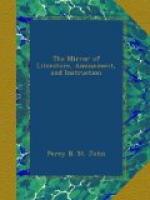Who hath not felt the magic of a voice,—
Its spirit haunt him in romantic hours?
Who hath not heard from Melody’s
own lips
Sounds that become a music to his mind?—
Music is heaven! and in the festive dome,
When throbs the lyre, as if instinct with
life,
And some sweet mouth is full of song,—how
soon
A rapture flows from eye to eye, from
heart
To heart—while floating from
the past, the forms
We love are recreated, and the smile
That lights the cheek is mirror’d
on the heart!
So beautiful the influence of sound,
There is a sweetness in the homely chime
Of village bells: I love to hear
them roll
Upon the breeze; like voices from the
dead,
They seem to hail us from a viewless world.
[2] We know a reverend vicar who once took the trouble to count all the quotations from Scripture, which occurred in a charity sermon he had just printed: and his great satisfaction at the conclusion was, that his was indeed “a scriptural sermon.”
* * * * *
PERSECUTION OF THE JEWS.
We know it to be a fact, that a Jew, an artist of reputation, who had conceived a great confidence in a Christian engaged in the promotion of the conversion of the Israelites, revealed to him, that both he and his brother had been Christians from their childhood from having been bred up amongst Christians, but were too indignant at the treatment which they and their brethren met with at Christian hands, to profess Christianity; and he earnestly pleaded, as essential to their being induced to receive the gospel, that those who participate in the attempt should approach them with a language of decided affection for Israel.—Q. Rev.
* * * * *
ABSENTEES
Soon become detached from all habitual employments and duties; the salutary feeling of home is lost; early friendships are dissevered, and life becomes a vague and restless state, freed, it may seem, from many ties, but yet more destitute of the better and purer pleasures of existence.
* * * * *
ITINERANT OPERAS.
The first performance of the opera seria at Rome, in 1606, consisted of scenes in recitative and airs, exhibited in a cart during the carnival.
* * * * *
THE GAMUT.
Guido D’Arezzo, a monk of the 13th century, in the solitude of his convent, made the grand discovery of counterpoint, or the science of harmony, as distinguished from melody; he also invented the present system of notation, and gave those names to the sounds of the diatonic scale still in use:—ut, re, mi, fa, sol, la, si; these being the first syllables of the first six lines of a hymn to St. John the Baptist, written in monkish Latin; and they seem to have been adopted without any special reason, from the caprice of the musician.—Foreign Rev.




